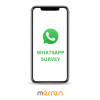Unless you are an exception in this hyperconnected world, chances are you rely on the apps on your smartphone for everything from communication to shopping. Be it for work or personal updates or information from family and friends you are on numerous messaging app groups.
A recent analysis of data from 90 countries worldwide, by Similar web Market Research Intelligence shows that WhatsApp, Facebook Messenger and Telegram are the top three messaging apps worldwide with 31% of the world using WhatsApp followed by 7% using Facebook Messenger and 4% using Telegram.
With messaging apps dominating communication today, it is no exaggeration to state that when the need arises for a business to conduct a customer survey, messaging apps on non-browser-based platforms-offer efficient and cost-effective results. Here is why.
Comfort is primary
Let us assume you need your customers to send you a video. Would you rather they record it on their phone, go to the survey link on a laptop or PC, open the survey link and attach the video or simply have them open WhatsApp or FB Messenger, hit the camera button and send you an instant response.
The answer is quite obviously the latter because it is convenient and no matter where your customers are based, it will take them a few minutes to respond as they are already comfortable using the medium for various uses.
Brevity is the essence
Social media dominates our lives and business today. Gone are the days, when businesses had the chance to interact with their customers sparingly and ask long-winded questions that could take more than 30 minutes to an hour to answer.
In this era of short attention spans, using messenger-based surveys allows to carry out short and focused surveys throughout the year. The advantage of such surveys is that they can be carried out at frequent intervals, have higher completion rates and provide improved, actionable data. Additionally, it helps avert blind spots that may be a result of sparse customer interaction.
Ensuring authenticity and building trust
Manufactured identities (fake email ids) have been a common problem that online surveys have had to battle. With messaging apps, it is difficult to create fake ids as numbers/profiles have to be validated. The result is access to a data pool of authentic respondents.
In this data-driven world, privacy is a universal concern. With a rise in digital marketing tools, customers have burnt their fingers in the process of sharing information with unethical marketers.
Messaging based surveys can be used to build trust and loyalty among your customers. You can dispel fear and scepticism you have the opportunity to assure them that the data will be used ethically only after you have received consent from them.
Further, when you provide information that is useful information to the customer, the success rate of the survey is high. This is because there is an exchange of information rather than a lopsided demand for responses.
Lower Abandonment
The success rate of messenger-based surveys can also be attributed to the fact that there is a lower chance of abandonment. Each time a respondent opens the app, which is several times a day, there is a nudge to complete the conversation (unanswered questions in a survey) that is quicker and faster.
This is as compared to web browser-based surveys, which tend to be long winded and are often forgotten as they are opened up in another browser, that the user does not have the impetus to get back to at the end of the day. With abandonment rate being pivotal to surveys of any kind, non-browser platforms score over their browser-based counterparts there.
The cost factor
Primarily, non-browser based surveys are not only effective for businesses, but they are cost-efficient as they have greater reach and do not involve the large costs of physical surveys and do not lead to loss of data. With close to 5 billion people worldwide using messaging based apps on their smartphones today, messenger-based apps are a cost-effective research tool.





